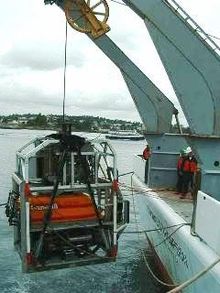First mate

The Chief mate is customarily in charge of the ship's cargo and deck crew.
|
|
| General | |
|---|---|
| Other names | Chief officer Boss Man |
| Department | Deck department |
| Reports to | Captain |
| Licensed | Yes |
| Duties | Cargo officer, Deck department head. |
| Requirements | Chief Mate's License |
| Watchstanding | |
| Watchstander | Yes/Depends on shipboard manning requirements |
| Watch (at sea) | Varies (0400-0800, 1600-2000) |
| Watch (in port) | Varies (0800-1700) |
A chief mate (C/M) or chief officer, usually also synonymous with the first mate or first officer (except on passenger liners, which often carry both), is a licensed member and head of the deck department of a merchant ship. The chief mate is customarily a watchstander and is in charge of the ship's cargo and deck crew. The actual title used will vary by ship's employment, by type of ship, by nationality, and by trade. Informally, the Chief Mate will often simply be called "The Mate." The term "Chief Mate" is not usually used in the Commonwealth, although Chief Officer and First Mate are.
The chief mate is responsible to the Captain for the safety and security of the ship. Responsibilities include the crew's welfare and training in areas such as safety, firefighting, search and rescue.
The Chief Mate, who is the second in command of the vessel, is often equated, in corporate terms, to a senior manager for the operations on board, as the Mate is in charge of a number of departmental functions. In modern cargo vessels, the Mate holds appointments like Head of Deck Department, Head of Cargo/ Stowage Operations, Head of Safety/ Fire Fighting, Head of On-Board Security (Ship Security Officer), Head of Environment and Quality, and so forth.
As cargo officer, a chief mate oversees the loading, stowage, securing and unloading of cargoes. Moreover, the chief mate is accountable for the care of cargo during the voyage. This includes a general responsibility for the ship's stability and special care for cargoes that are dangerous, hazardous or harmful.
Even under the best of conditions, a ship is balanced precariously upon the water and is subject to a number of forces, such as wind, swells, and storms, which could capsize it. The cargo officer uses tools like ballasting and load balancing to optimize the ship's performance for the expected type of environment.
Traditionally, the chief mate stands a "4-8" watch: from 4 AM until 8 AM and 4 PM until 8 PM., in port and at sea, the chief mate is responsible to the captain for keeping the ship, crew, and cargo safe. On watch, the mate must enforce all applicable regulations, such as the International Convention for the Safety of Life at Sea and pollution regulations. In port, the watch focuses on duties such as cargo operations, fire and security watches, monitoring communications and the anchor or mooring lines.
...
Wikipedia
